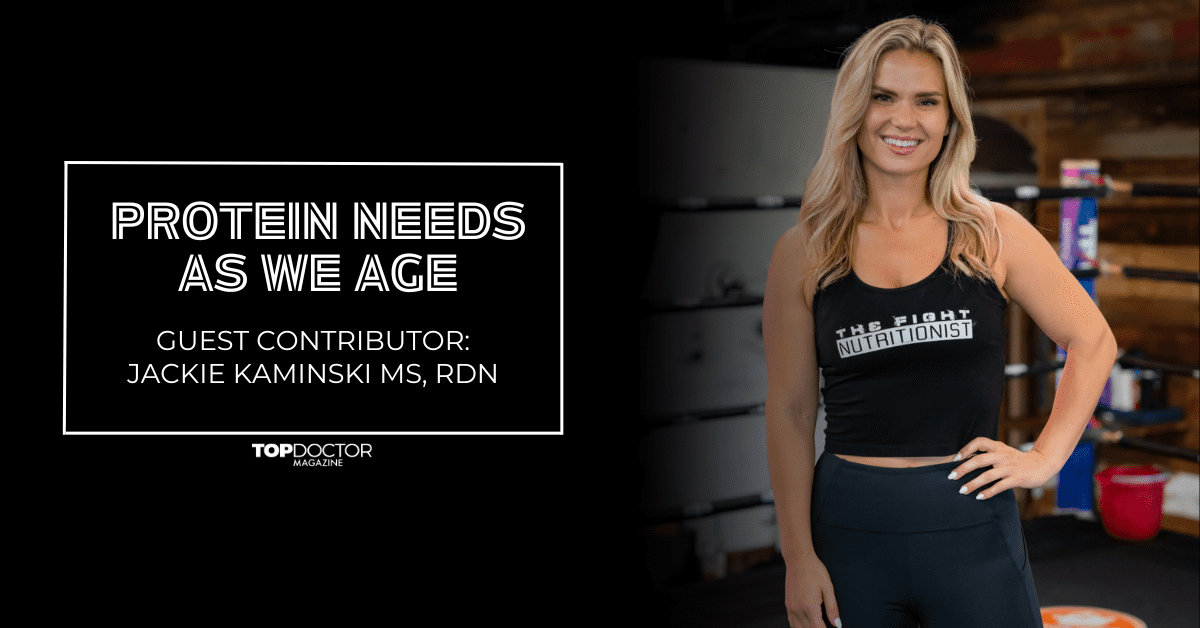Protein! The King of Macronutrients!
By now, the health and fitness industry has shed an abundance of light on the importance of protein in your diet. But… do your protein needs change as you age?
Is the recommended dose of 20-30g of protein per meal or post-workout sufficient to induce that muscle-building response across the lifespan? The answer, unfortunately, is no.
If you’re wondering why, after age 50, the same nutrition tactics that might’ve once worked in your youth are no longer working, here’s why.
Muscle mass decreases at a rate of 1-8% per decade after the age of 30 and becomes more significant after the age of 60 (1). These losses occur partly due to alterations inside cells affecting muscle fiber size, muscle cell number, reduction of ATP and glycolytic enzymes, and blunted responses to meal ingestion. Hormonal changes also play a prominent role in the ability to build muscle. By the age of 60, a majority of men will experience significant drops in testosterone levels that decrease to levels below normal youthful values. Similarly, menopause is a significant life event where women experience more difficulty maintaining and building lean mass.
So, if all these physiological changes are occurring, what is the new required stimulus to help boost protein synthesis or the muscle-building response via food?
The optimal protein intake to create a maximal anabolic or muscle-building response in elderly individuals is 35-40g of protein per meal or 0.40g/kg/meal of high-quality protein. It is recommended to have a total daily protein intake of 1.2-2g/kg per day. So, for an individual weighing 150 lb., that would equate to a total daily protein intake of 82-136g per day.
Several studies have demonstrated the need for higher protein doses in elderly individuals. One study evaluated lean body mass changes in men and women with an average age of 74.5 years. Protein intake was separated into five quartiles ranging from daily intakes of 0.8-1.2g/kg/day. The group in the highest quartile lost 40% less lean muscle mass than those in the lowest quartile group (3). Another study looking at muscle protein response following protein ingestion in young and older men found that a dose of 40g of high-quality protein was required to maximize muscle protein synthesis (5).
Does Protein Timing Matter?
Protein timing has been a long-debated topic. Should you split your daily protein needs evenly throughout the day, or can you consume everything you need in a single bolus?
Meeting total daily protein needs in a day is the most important. However, it is recommended to evenly space protein feedings throughout the day for exercising individuals. Consuming 35-40g of protein every 3-4 hours and within 2 hours after exercise will offer the greatest benefit in maintaining and building lean body mass. It is more important for women to consume protein as soon as possible after exercise.
Protein Quality
Maximizing muscle protein synthesis is also largely dependent on the type and amount of dietary protein consumed. Leucine, an amino acid, is the most potent muscle-building stimulator. Therefore, a high-quality protein will contain roughly 3g of leucine per 35-40g serving of protein.
High-quality proteins are any animal-based protein. Examples include fish, eggs, chicken, beef, turkey, and milk products.
If you consume a plant-based diet, you will need to consume a larger protein bolus to achieve the same anabolic response. Plant proteins often lack one or more essential amino acids and are typically low in leucine. Additionally, the fiber and the presence of other phytochemicals blunt the absorption of proteins present in various plant-based sources.
Muscle Building Supplements & Latest Findings
What are the best muscle-building supplements for individuals as they age?
The more obvious supplements would be protein powders and amino acids. When it comes to protein powders, fast-absorbing protein (whey) will be more beneficial than slow-digesting proteins (casein) in order to achieve a maximal protein synthetic response, especially after exercise. Amino acids are the simplest form of protein and, therefore, will have the fastest absorption rates.
While protein consumption after exercise is required to enhance muscle protein synthesis, research has also shown really great benefits to supplementing with protein during exercise in older individuals. One study showed a 30-40% increase in muscle mass and strength when consuming protein during prolonged resistance training.
When purchasing amino acids, aim to get an essential amino acid that contains approximately 10g of EAA’s (essential amino acids) per serving.
Newer research has also shown some incredible benefits to consuming a 40g protein bolus right before bed. When elderly subjects consumed a 40g bolus of casein protein before bed, overnight muscle protein synthesis rates were 22% greater than individuals who consumed a placebo.
Creatine is a naturally occurring collection of amino acids that exists naturally within the muscles, brain and, to a small extent, the testes in men. Creatine is responsible for increasing muscle mass and strength. For older individuals, especially active older individuals, creatine has been shown to be a great aid in maintaining and building lean muscle mass. Recommended doses can range from 2-10g/day.
Collagen is the body’s most abundant form of structural protein, making up connective tissues, skin and tendons. As we age, the body produces less collagen, leading to thinner skin and an increased risk for joint and tissue injury. Many studies have indicated that the use of daily collagen protein aided in reducing joint discomfort, improved bone mineral density, and increased lean body mass in elderly individuals.
Conclusion
As we age, many different physiological changes take place that can accelerate the loss of muscle mass, increase the risk of injury, and make it harder to enjoy day-to-day activities. However, by maintaining an active lifestyle and making minor adjustments to your diet, you can significantly mitigate the adverse effects of aging.
When it comes to diet, consuming protein is going to be the most important factor in order to build and maintain lean mass. As we age, consuming rich protein sources in larger boluses is more vital since the muscle protein synthesis response to food is blunted.
To maximize your muscle-building potential, follow these steps:
- Consume 35-40g of protein every 3-4 hours
- Consume 40g of whey protein after exercise
- Consume 40g of casein protein before bed
- Combine a collagen protein powder with your protein supplement to enhance joint health
- Consume 10g of essential amino acids during training to enhance muscle protein synthesis
- Consume 5g of creatine per day to increase muscle mass and strength
Protein is still the king of macronutrients! It just becomes more important as we age.
Jackie Kaminski- Registered Sports Dietitian Based Out of South Florida. Owner and CEO of Her Company: The Fight Nutritionist.
You can find Jackie at https://thefightnutritionist.com or on Instagram @thefightnutritionist
Sources:
https://www.ncbi.nlm.nih.gov/pmc/articles/PMC2804956/
https://www.ncbi.nlm.nih.gov/pmc/articles/PMC4924200/
https://www.sciencedirect.com/science/article/pii/S0002916523234486?via=ihub
https://www.ncbi.nlm.nih.gov/pmc/articles/PMC4208946/
https://www.gssiweb.org/sports-science-exchange/article/sse-160-dietary-protein-to-support-active-aging#:~:text=A 30-40 g dose,rates in the older adult.
https://jissn.biomedcentral.com/articles/10.1186/s12970-017-0189-4#:~:text=Ingesting a 20–40 g,body composition and performance outcomes.
https://www.ncbi.nlm.nih.gov/pmc/articles/PMC6415027/#:~:text=Conclusions-,Protein ingested prior to sleep is effectively digested and absorbed,in both young and old.
https://www.drstacysims.com/blog/should-women-take-collagen-supplements
https://www.cell.com/heliyon/pdf/S2405-8440(23)02168-0.pdf
https://link.springer.com/article/10.1007/s00726-021-03072-x
At TopDoctor Magazine, our mission is to foster connections within the health and wellness community, acting as a vital bridge between doctors and patients and facilitating collaborations between medical companies and healthcare professionals.
Our purpose extends to empowering our readers, providing them with the knowledge to make well-informed healthcare and lifestyle decisions.
We take pride in being the ultimate resource for interviews with health and wellness leaders, delivering trending medical news, and covering a wide range of healthy living topics.






0 Comments